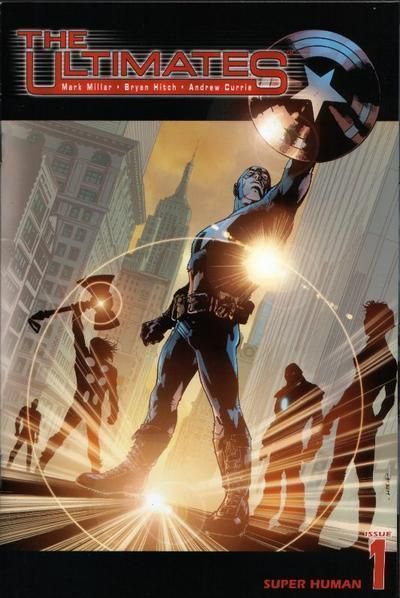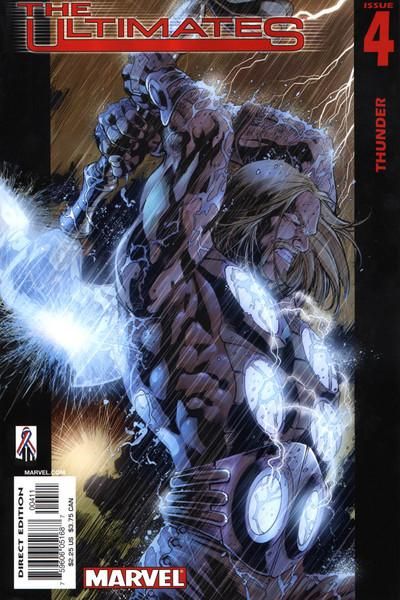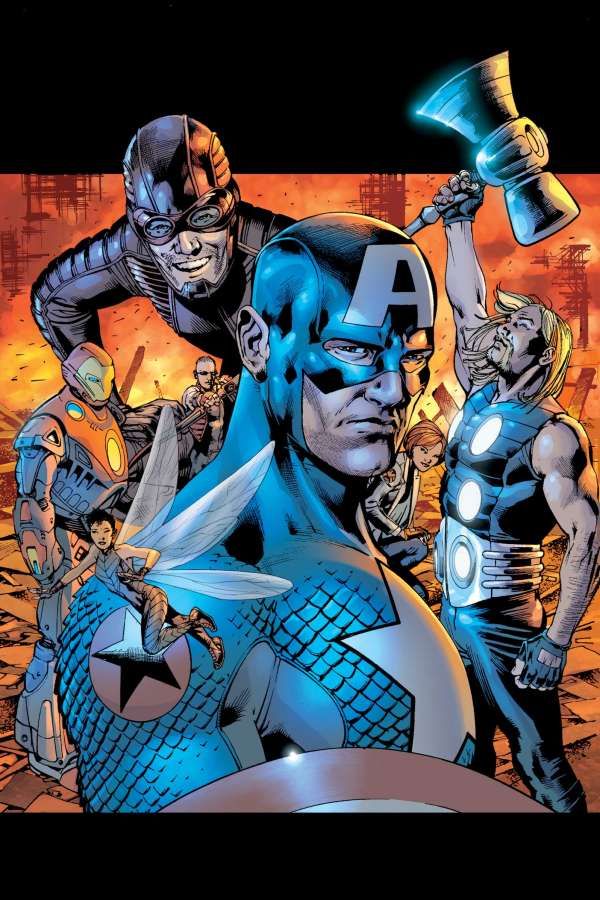After last week's rerun reread review where I tore into Mark Millar's Ultimate X-Men, I said that I would have a sequel of sorts this week -- and it's a book I actually enjoy! My just-now-decided Ultimate Marvel Month of reread reviews that ties into the end of Ultimatum and launches of Ultimate Comics Avengers and Ultimate Comics Spider-Man continues this week. Spoilers, of course.
The Ultimates #1-13 by Mark Millar and Bryan Hitch fights with Ultimate Spider-Man for the label of 'Best Ultimate Title' (pretty much why they are the two books kicking off the relaunch of the line) and it's pretty easy to see why right away -- it's Ultimate Avengers and embraces the thrown together nature of the original property while also working in the epic, legendary feel of the original property. Those two forces seem opposed to one another, but Millar manages to balance them, so you find yourself going "Oh, this group is a disaster" before a small moment gives you that little thrill you had when you were kid and these guys were kicking ass as the Avengers... The group here is dysfunctional and probably the most unlikable superhero team you're likely to find, but it's interesting.
I remember when it was first announced and Millar, in his usual subtle way, declared that this title would do for superhero team books in the 21st century what Lee and Kirby's Fantastic Four did for them in the '60s (or something like that). Now, the book doesn't do that, of course. It's an action movie in comic book form, so shooting to remake and redefine a whole category of books in the genre is a bit much, but I always loved that Millar said that. (On a side note, I've always wanted to do a lot of research, find as many Millar interviews as possible, pick out all of his hyperbolic statements, and then hold a roundtable with various comics critics as we examine the quotes and the actual works to decide just how far off Millar's self-hype turned out to be. But, that always seemed a bit mean, don't you think?) Now, Millar's approach here is a bit different, but I wouldn't call is revolutionary -- sloppy and unstructured seem more appropriate descriptors, honestly.
The first half of The Ultimates seems unfocused and mostly unrelated to the second half (or, more accurately, the final four or so issues). Now, I think this approach works for the book, it isn't really problematic until you begin looking at the story as a whole. While reading it, you don't really noticed that there's a sudden shift in the overarching plot when the mission to stop the Chitauri comes up. They'd been hinted at in the first issue when Captain America mentions that there are more sides to the war than anyone will ever find out, but, otherwise, there is zero indication that these are the big villains of the story or that defeating them will be the climax until the eighth issue when the team, now comprising Hawkeye, the Black Widow, Quicksilver, and the Scarlet Witch (chacters, at best, alluded to prior -- at worst, not mentioned at all) is briefed on their existence. It's a bit jarring and somewhat forced since the direction of the book was quite different until that point, coming out of the improvised decompressed storytelling that focused on the small, human challenges that a team like this would face. Part of me would have enjoyed this book a lot more if the only major threat they faced was the Hulk, one of their own, a self-created threat to justify their existence. But, I'm also a cynical bastard at times... Somehow, Big Alien Invasion seems too convenient, too much what the team needed to prove itself, which is the logical thing to include in a story that begins by showing just how slapped together and shit this group is... but, like I said, Millar was improvising for the first half of the book, giving things more room to breathe, and that changes the overall feeling and the story, and its structure. He says in the commentary to this story in the hardcover (which is how I have this and The Ultimates 2 -- lovely books, you should get them) that they began thinking of issues as chapters of a novel, not individual issues of a comic series, but the second half of the story doesn't really show that. The first half is stronger than the second, because it's not what you'd expect, it meanders and wanders through these characters. At times, it's a bit much (the 'who would play who in a movie' discussion, for instance), but it was far more interesting and daring. As a result, I'll probably wind up sticking to the first half of the story more.
If you look at this book as structured like a movie, the first issue reads even better than it does otherwise. How many summer blockbusters do we see that begin at some point in the past, telling a seemingly unrelated story, and then SMASHCUT to a big shot like Mount Everest? Millar and Hitch nail that aspect 100%. The flashback is extended in comic terms, but would take up around ten minutes of a film, give or take a few minutes... and then we're right into it with Tony Stark, and then Nick Fury and Bruce Banner. I'm not sure if it would have worked as well if the WWII sequence was only seven pages as originally planned, because it is very quite well done here.
The updating of these characters is one of Millar's strong points (for the most part). Yes, these characters are less heroic, more dickish, more 'witty' (aka cold), but, for a group of superhumans working for the military, I think that's appropriate. I am a big fan of Ultimate Captain America, because I can't stand the guy. I fucking hate Ultimate Captain America. He's an asshole, a bully, a man who thinks that might makes right... and he's representive of most of the team in that respect (which I'll get to in a moment). Ultimate Captain America is how you would expect a super-soldier to act -- it's hard to hold it against him as everything he's experienced naturally leads him to his place as a violent, somewhat cruel man. If confronted with a problem, his first instinct to use his fists. His takedown of Hank Pym is a great example, where he's bigger and stronger than Pym (even when Pym grows), and knows that ahead of time. Now, Pym deserves what he gets from Cap, but Cap is not above kicking the crap out of a weaker opponent as long as it conforms to his sense of morality.
A disturbing element of The Ultimates, for me, is how most of the lead male characters are/were physically weak men (often brilliant) who are obsessed with becoming physically strong. Now, in a modern superhero book, there's no idea more appopriate than that since it's at the core of the stories (and readership), but it's overkill how this concept keeps appearing. Banner, Pym, Thor, Stark, Rogers... all weak at one point, all become strong and act violently. We learn that Steve Rogers used to be bullied, so there's probably a part of him that enjoys being the big strong man now -- so much so that he can't help but be a bully at times. The Banner/Hulk incident and the Pym/Jan fight happen back-to-back, as both men admit that they want to be big (Pym implies it by saying Jan shouldn't have made him look small). Thor was a male nurse that had a nervous breakdown before becoming a thunder god 'pacifist' that beats the holy hell out of people. Tony Stark has a brain tumour that will stop his body at some point, so he builds a suit of armour that acts as a second, better body. The core group of the Ultimates are pathetic geeks who can't get over the idea that being big and strong is all that matters. This is a sentiment enforced by one another and by some of those around them. Betty Ross, for instance, makes it very clear that brainy, weak Bruce Banner is barely worth her notice (despite going out with him?), but Hulked out Banner deserves a conjugal visit? Jan doesn't say anything to suggest that Pym is weak, he puts those words in her mouth -- and, eventually, she agrees although not directly (she more suggests that he's not as brilliant as he wants everyone to think he is).
The concept of the weak, intelligent man becoming physically strong to prove himself is nothing new in superhero comics. It's a genre built on the idea that physical superiority is the best thing one can possess; a large part of the escapism readers look for is that sense of power, which they have little of in real life. The superhero comic book reader is, in a general, broad sense, a geek who was bullied growing up, and reading about Peter Parker, a geek who was bullied growing up, gaining superpowers and beating up bad guys... it's nice. We imprint ourselves onto him, we imagine we are him, and that's fine. But, there's something about the over-the-top way that Millar shoves that idea down our throats that I find bothersome. These are small, petty men that he's writing about, men of brilliance -- but they just want to be big. Where is the man confident in his intellect? The man who doesn't need to beat the crap out of others? I know, genius is insecure, and everything about the world tells us that being smart is fine and nice as long as you aren't too smart and you remember that someone bigger can always make you feel small. I'm not really criticising Millar here, I want you to know. If I find these characters and plots bothersome, it's because they are. That's the way of the world. In wrestling, there are a few easy ways for a bad guy to get the crowd to hate him, one of which is to prove that he's intelligent and educated. Why is that? What is it that makes Bruce Banner, Hank Pym, Tony Stark... why do they feel the need to use their brilliance to find ways to make them big and strong?
I think there's a connection between the intelligent and superhumans that Millar implies (whether he intends to or not), that level of discomfort that's raised in the 'average' person. There's a reason why physical and intellectual superiority are treated differently: with work, anyone can become physically strong, but intelligence is something you're born with. You can work out, you can train, you can eat right, and you will get stronger... but, there's only so smart and educated you can be. Eventually, you will hit a wall because of your own limitations. It's random. So are superpowers (demonstrated best in mutants). I mean, it's not a coincidence that Captain America assaults the group's two resident geniuses -- they did deserve what he did, but Cap is the team's 'average' guy... he may be big and strong and a brilliant tactician, but he's really just like everyone else -- and I think he enjoys beating down Banner and Pym. The unease felt by SHIELD at Banner's inability to find the super-soldier formula and that felt by the public at the Ultimates' lack of results/action are not unrelated. We expect a lot from the brilliant and the super. They claim to be superior, so give us some results -- and that Banner solves both problems (in a way) through a single action is fantastic. My point is... well, usually, this is where my rambling tends to provide me with some sort of insight, but that appears to have not happened this time. Have I gone off track a little here? Um, maybe? Ah well... I like the way Millar captures these two related ideas in The Ultimates.
The Ultimates is a big, dumb summer blockbuster. Millar and Hitch do good work here. The second half of the story has a lot of great little moments. But, I want to quickly talk about the attitude displayed by the book toward the military, which I think is a negative one (despite promoting the concept of physical violence solving problems). As I said before, Captain America is an asshole. He's a bully. He represents the military and does so in a macho bullshit sort of way. Sure, him saying parachutes are for girls and things like that are very funny and cool, but he's also a jackass about it. So are the other soldiers in the story -- they definitely love Banner getting beaten or the pushing the kid aside... the military is not shown in the best of lights here. It's an odd internal conflict since, as I've said, the book promotes the idea that might makes right, that beating the shit out of your enemy gets the job done goddamn it... as well it should being a superhero comic book and all, but... still, odd. Not that I necessarily disagree with those sentiments, but... it's odd.
The updating of the characters here are all well done. I still question Captain America's costume in that his ears are sticking out -- all I see are two big targets that could cause some serious damage. I really like Millar's updates of Stark, Banner, and Hawkeye... Tony Stark is played up as the drunk playboy with a good heart very well; Banner as the struggling genius who genuinely likes becoming the Hulk sometimes is great; and a Hawkeye that's a bit more no-nonsense and not as goofy works for me.
I'm just spitballing by now, if you couldn't tell.
I've talked a lot about the men in the book (and concepts of masculinity), but what about the women? Jan and Betty are our two main women in this book. Betty is superficial, selfish, cruel, and directly causes a whole shitload of problems -- which isn't helped by her admitting that she likes that Banner would do that because of her. Jan is messed up, but strong. I'm not sure what to say about her relationship with Pym, honestly (maybe I'll get into it next week since it gets more complicated in The Ultimates 2). She is abused, but she fights back -- she's stuck with a jackass, mostly out of self-loathing over her being a mutant (and a kind of disgusting one it seems... by the average person's standards...). She doesn't tear into Hank until he verbally attacks her -- she defends herself, while Betty abuses others. That they were roommates groups them together more -- they're the opposites in many ways, I think.
That's it for me this week. Coincidentally, Brandon Thomas wrote about The Ultimates this week in his Ambidextrous column at Newsarama and plans to discuss Ultimates 2 next week -- and so do I! So you can get a nice overdose of these books if you want. I bet the book I discuss at the end of month to conclude this little series of themed posts will be different than what he writes about next, though. If not, I'll be a little freaked. Next week, The Ultimates 2 where things get bigger, weirder, and more coherent as a whole!




